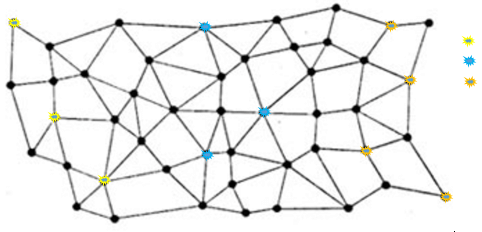Blockchain technology has evolved quickly and has positively impacted some industries, especially financial sectors and banking. Blockchain has a lot of potential to impact the food and beverage industry.
How Blockchain can be implemented in the Food Supply Chain
In simplistic terms, an optimal blockchain operates as a distributed ledger network in which all parties are interconnected to each other. Picture a string of net lighting.

In an F&B example, imagine the entire supply chain from farm to producer to consumer being connected all in the same network. If a farm were to issue a product recall or food safety warning, you can see how information would automatically flow through all connected network paths as if a current of electricity surging through the string of net lights to illuminate each individual bulb. The advantages could be extraordinary.
Benefits of Blockchain in Food and Beverage
- Instantaneous, highly efficient delivery of messages throughout the entire supply chain. Product traceability that used to take days/weeks can be completed in seconds.
- Constant connection of food awareness for growing cycles
- Transparent traceability to food sources that can:
- Increase accountability of suppliers, middlemen and retailers
- Validate authenticity of organic materials and non-GMO ingredients
- Awareness of free-range conditions of livestock
- Ability to predict crop shortages based on weather or environmental disasters that might limit inventory availability for necessary production and allow buyers to source alternative suppliers.
- Decentralized reporting and compliance
- Identifying specific serial numbers, lots, etc to avoid losses from broader food recalls.
In a letter to the editor Food Safety News described blockchain as a decentralized cloud-based ledger. They quoted Frank Yiannas, vice president of food safety for Walmart, who said, blockchain could become the “equivalent of FedEx tracking for food.” Each time there is a transaction in the food’s journey, information about it is added as a “block” to the online network ledger. Information from harvest crew, date, and time, to temperature, storage, and sanitization along each step of the path from farm to store can be easily and quickly uploaded.
The application and benefits of blockchain technology is exciting. It could provide a pathway to streamline transparency in food production. Blockchains compliment ERP platforms, businesses should start thinking about how they want to implement blockchain within their supply chains.
Several software publishers are currently investigating, exploring and developing applications to leverage the blockchain concepts within ERP/ Business Management Software to improve operational and transactional processing. As the technology matures and networks advance, the blockchain technology will emerge as a trend that will impact how we use ERP in the future.
Subscribe to our blog and follow RKL eSolutions as we cover the development of blockchain technology in ERP software!
Subscribe to the Blog Series